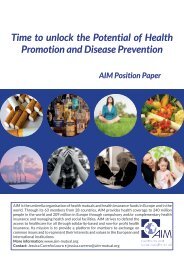Exploring patient participation in reducing health-care-related safety risks
Exploring patient participation in reducing health-care-related safety risks
Exploring patient participation in reducing health-care-related safety risks
You also want an ePaper? Increase the reach of your titles
YUMPU automatically turns print PDFs into web optimized ePapers that Google loves.
e desirable to have a special statute concern<strong>in</strong>g <strong>patient</strong>s’ rights (de Oliveira, personal<br />
communication, 2012).<br />
Patient <strong>participation</strong> <strong>in</strong> elective surgery <strong>safety</strong> <strong>in</strong> Portugal<br />
The <strong>in</strong>creas<strong>in</strong>g awareness of this subject among Portuguese legislators is noticeable,<br />
as illustrated by the Parliamentary discussions on the 2008 Bill No. 788/X (which<br />
focused on the right to be <strong>in</strong>formed and <strong>in</strong>formed consent) (33) and the special concern<br />
expressed by the 10th Health Parliamentary Commission. Several bills have been<br />
<strong>in</strong>troduced <strong>in</strong> the Portuguese Parliament to replace the Basic Law on Health (No. 48/90<br />
of 1990) (31) with more detailed legislation regard<strong>in</strong>g <strong>patient</strong>s’ rights (Table 6.1).<br />
Three charters provid<strong>in</strong>g for protection of <strong>patient</strong>s’ rights with<strong>in</strong> the NHS have been<br />
developed. Although they are not legally b<strong>in</strong>d<strong>in</strong>g, these tools represent an important<br />
commitment on the part of the Portuguese Government <strong>in</strong> this field.<br />
The M<strong>in</strong>istry of Health published a charter of <strong>patient</strong>s’ rights and duties <strong>in</strong> 1997 (34). 33<br />
Its ma<strong>in</strong> goals are to assert the citizen’s role as the ma<strong>in</strong> actor <strong>in</strong> the <strong>health</strong> system and<br />
to (re-)assure fundamental human rights <strong>in</strong> <strong>health</strong> <strong>care</strong> provision, especially <strong>in</strong> terms of<br />
protect<strong>in</strong>g human <strong>in</strong>tegrity and dignity, as well as the right to “autodeterm<strong>in</strong>ation” (34).<br />
Among other rights, the <strong>patient</strong> has the right to be <strong>in</strong>formed about available <strong>health</strong><br />
services, the competences and levels of <strong>care</strong> available with<strong>in</strong> them (Article 5), and to<br />
be <strong>in</strong>formed <strong>in</strong> a clear way about diagnosis, prognosis, treatment possibilities and <strong>risks</strong><br />
(Article 6). Patients also have the right to access <strong>in</strong>formation <strong>in</strong> their own cl<strong>in</strong>ical file<br />
(Article 10) and to a second op<strong>in</strong>ion about their <strong>health</strong> condition (Article 7), and to give<br />
or refuse their consent before any medical or research procedure (Article 8). The right to<br />
<strong>safety</strong> is vaguely stated <strong>in</strong> Article 1 (right to human dignity) and Article 3 (right to be<br />
treated <strong>in</strong> a proper way) (Table 6.1).<br />
A charter on <strong>in</strong><strong>patient</strong>s’ rights and duties, based on this charter, was published <strong>in</strong><br />
2005(36), 34 with HCWs as its ma<strong>in</strong> target.<br />
A charter for hospitalized children (38) approved <strong>in</strong> 1988 <strong>in</strong> Leiden was published <strong>in</strong><br />
Portugal <strong>in</strong> 1998 by the Portuguese Child Support Institute. The charter declares that<br />
children and families have the right to receive appropriate <strong>in</strong>formation about a disease<br />
and its treatments, with the purpose of be<strong>in</strong>g able to take part <strong>in</strong> the decision-mak<strong>in</strong>g<br />
process. It also states that hospitals should respond to children’s needs, assur<strong>in</strong>g <strong>safety</strong>,<br />
proper equipment and professional <strong>care</strong>.<br />
The Entidade Reguladora da Saúde (ERS) [Health Regulation Authority], an<br />
<strong>in</strong>dependent public entity responsible for oversee<strong>in</strong>g access to <strong>health</strong> <strong>care</strong> and for the<br />
ma<strong>in</strong>tenance of quality and <strong>safety</strong> of <strong>health</strong> services, published a technical report and<br />
presented the concept of a charter of consumers’ rights for public consultation and<br />
discussion on 2 June 2011 (39).<br />
33 Founded on the Portuguese Constitution (29); the Basic Law on Health (31); and the Hospitals Statute (35) .<br />
34 Founded on the Portuguese Constitution (29), the Convention on Human Rights and Biomedic<strong>in</strong>e (26), the Basic Law on<br />
Health (31), the Charter of Fundamental Rights of the European Union (37) and the Charter of Patients’ Rights and Duties (34).<br />
97



